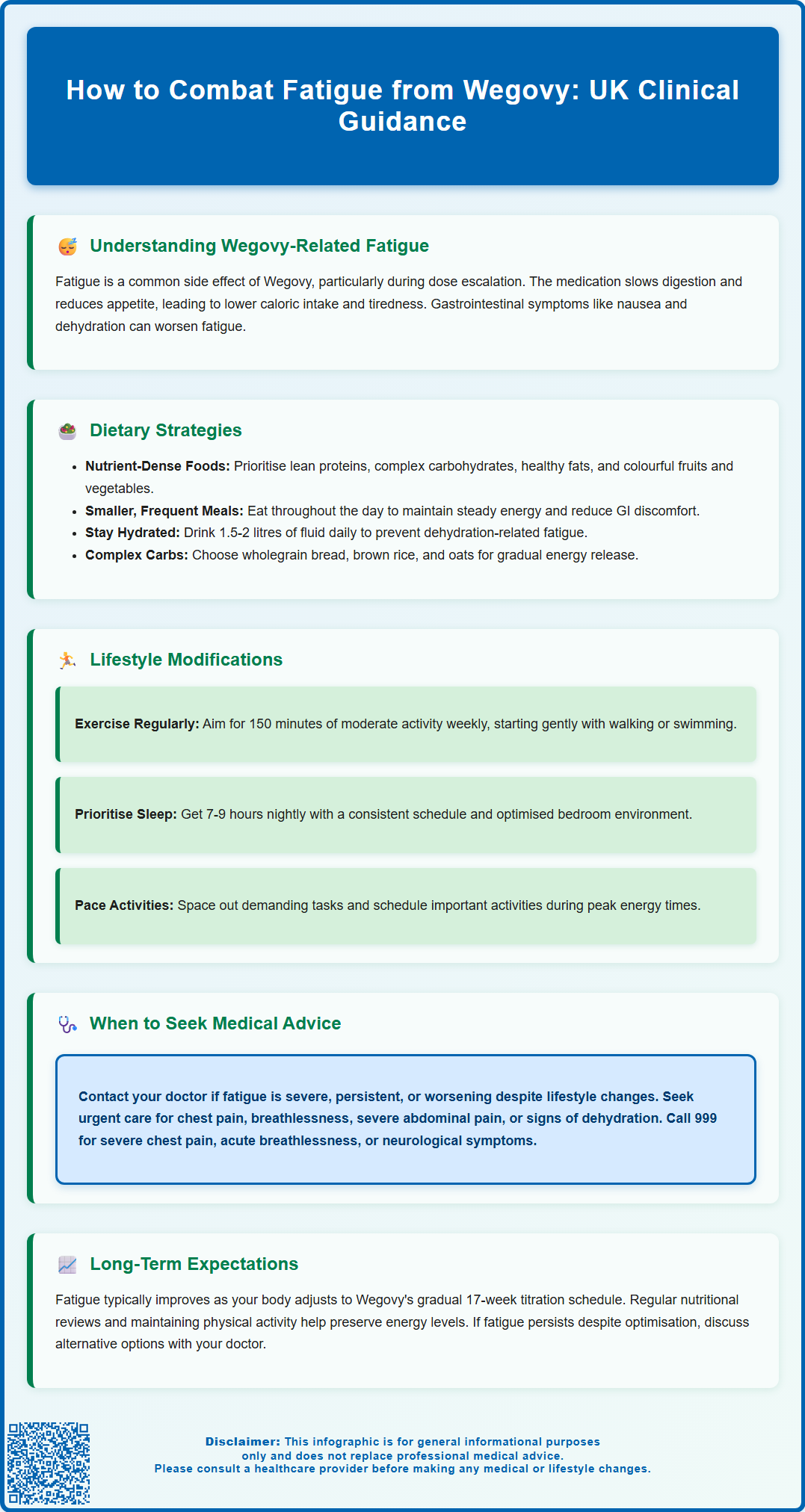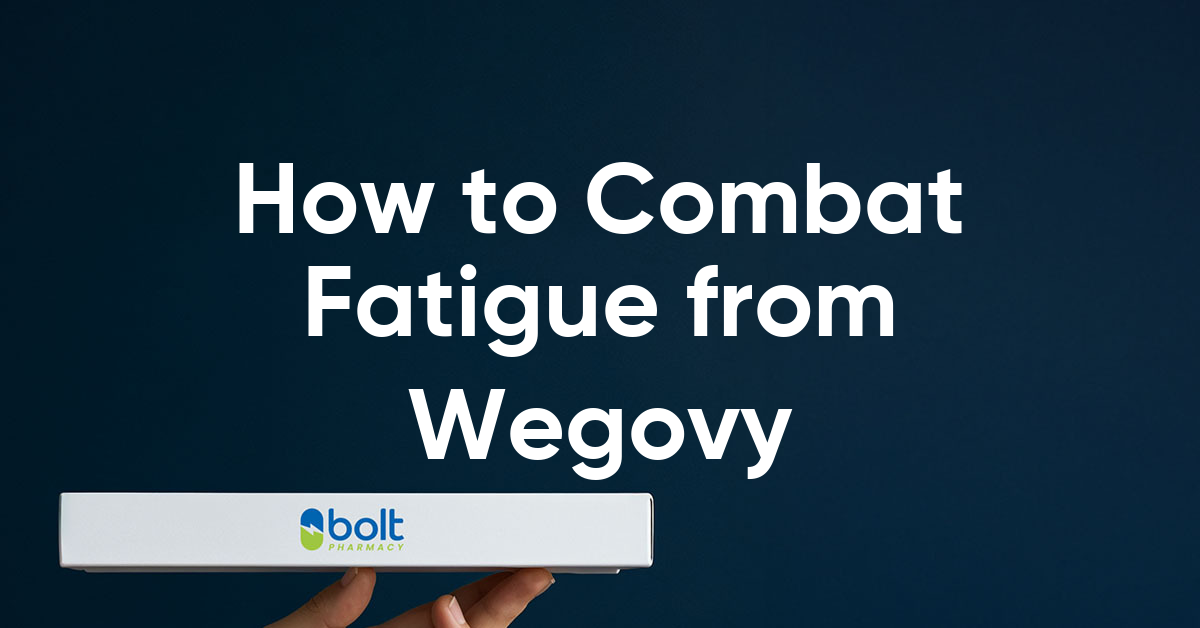Fatigue is a recognised side effect of Wegovy (semaglutide 2.4 mg), a GLP-1 receptor agonist licensed in the UK for weight management. Whilst this medication offers significant benefits for adults with obesity or overweight with comorbidities, tiredness—particularly during dose escalation—can affect quality of life. Understanding the underlying causes of Wegovy-related fatigue, including reduced caloric intake, gastrointestinal symptoms, dehydration, and metabolic adaptation, is essential. This article explores evidence-based dietary strategies, lifestyle modifications, and clinical guidance to help manage fatigue effectively whilst continuing treatment. Knowing when to seek medical advice ensures safe, sustainable weight management under appropriate clinical supervision.
Summary: Fatigue from Wegovy can be managed through nutrient-dense eating, adequate hydration, regular gentle physical activity, optimised sleep hygiene, and medical review if symptoms are severe or persistent.
- Wegovy (semaglutide 2.4 mg) is a GLP-1 receptor agonist that commonly causes fatigue, especially during dose escalation, due to reduced caloric intake and gastrointestinal side effects.
- Prioritising lean proteins, complex carbohydrates, healthy fats, and adequate hydration (1.5–2 litres daily) helps maintain energy levels whilst appetite is suppressed.
- Regular moderate physical activity (150 minutes weekly), quality sleep (7–9 hours nightly), and stress management techniques can significantly reduce tiredness.
- Seek medical advice if fatigue is severe, worsening, or accompanied by chest pain, breathlessness, dehydration, persistent vomiting, or signs of hypoglycaemia in people with diabetes.
- Fatigue often improves as the body adapts to Wegovy; dose titration can be slowed if side effects are problematic, and treatment should be reviewed regularly within specialist weight management services.
Table of Contents
Understanding Fatigue as a Side Effect of Wegovy
Wegovy (semaglutide 2.4 mg) is a glucagon-like peptide-1 (GLP-1) receptor agonist licensed in the UK for weight management in adults with obesity or overweight with weight-related comorbidities. Whilst the medication has demonstrated significant efficacy in clinical trials, fatigue is recognised as a common adverse reaction, particularly during the dose escalation phase.
The MHRA Summary of Product Characteristics (SmPC) for Wegovy lists fatigue as a common side effect. Several factors may contribute to this fatigue. GLP-1 receptor agonists work by slowing gastric emptying, enhancing satiety, and modulating appetite centres in the brain. This altered digestive process can lead to reduced caloric intake—sometimes substantially below previous levels—which may contribute to feelings of tiredness. Additionally, gastrointestinal side effects such as nausea, vomiting, and diarrhoea are common with Wegovy and can indirectly worsen fatigue through dehydration, electrolyte imbalance, or disrupted sleep.
For people with type 2 diabetes who are taking insulin or sulfonylureas alongside Wegovy, hypoglycaemia (low blood sugar) is another potential cause of fatigue that requires careful monitoring.
Understanding that fatigue may be multifactorial is essential. It can stem from the medication's direct effects, gastrointestinal symptoms, inadequate nutrition, dehydration, or the body's adaptation to significant metabolic changes. Recognising these potential contributors allows patients and healthcare professionals to implement targeted strategies to mitigate tiredness whilst continuing effective weight management therapy.

Dietary Strategies to Manage Wegovy-Related Fatigue
Optimising nutritional intake is fundamental to combating fatigue whilst taking Wegovy. The medication's appetite-suppressing effects can lead to significantly reduced food consumption, and without careful planning, this may result in inadequate energy and micronutrient intake.
Prioritising nutrient-dense foods is essential. Focus on incorporating:
-
Lean proteins (chicken, fish, eggs, legumes) to support muscle mass and provide sustained energy
-
Complex carbohydrates (wholegrain bread, brown rice, oats) which release energy gradually and help maintain stable blood glucose levels
-
Healthy fats (avocado, nuts, olive oil) in moderate amounts for essential fatty acids and fat-soluble vitamin absorption
-
Colourful vegetables and fruits to ensure adequate vitamin and mineral intake, particularly iron, B vitamins, and vitamin C
Given the reduced appetite, eating smaller, frequent meals throughout the day may be better tolerated than three large meals. This approach can help maintain steady energy levels and reduce the likelihood of gastrointestinal discomfort that might further diminish food intake.
Adequate hydration cannot be overstated. Dehydration is a common but often overlooked cause of fatigue, particularly if gastrointestinal side effects are present. The NHS recommends 6-8 glasses of fluid daily (about 1.5-2 litres). Herbal teas can contribute to fluid intake. If including fruit juices, these should be diluted and consumed in small amounts, particularly for people with diabetes as they can affect blood glucose levels.
Some patients may benefit from nutritional supplementation if dietary intake is substantially reduced. However, it is advisable to discuss any supplementation with a GP or registered dietitian before starting, as individual needs vary. Iron deficiency, vitamin B12 deficiency (particularly in those also taking metformin), and vitamin D insufficiency are common causes of fatigue that should be considered if tiredness persists despite dietary optimisation.
Lifestyle Modifications to Boost Energy Levels
Beyond dietary considerations, several lifestyle modifications can significantly improve energy levels whilst taking Wegovy. These strategies address both the physical and psychological aspects of fatigue management.
Regular physical activity, whilst seemingly counterintuitive when feeling tired, is one of the most effective interventions for combating fatigue. Exercise improves cardiovascular fitness, enhances mood through endorphin release, and promotes better sleep quality. The NHS recommends at least 150 minutes of moderate-intensity activity weekly for adults, plus muscle-strengthening activities on at least two days per week. However, during the initial adjustment period to Wegovy, it may be appropriate to start with gentle activities such as:
-
Walking for 10–20 minutes daily, gradually increasing duration
-
Swimming or water-based exercise, which is low-impact
-
Yoga or stretching routines to improve flexibility and reduce stress
-
Light resistance training to preserve muscle mass during weight loss
As tolerance improves, activity levels can be progressively increased. It is important to listen to your body and avoid overexertion, particularly if caloric intake is reduced.
Sleep hygiene is equally crucial. Aim for 7–9 hours of quality sleep nightly. Establish a consistent sleep schedule, create a comfortable sleep environment (cool, dark, and quiet), and limit screen time before bed. Some patients report that gastrointestinal symptoms from Wegovy can disrupt sleep; while the SmPC states Wegovy can be taken any time of day with or without food, some people find taking the injection earlier in the day may help with sleep disturbances.
Stress management techniques such as mindfulness, meditation, or cognitive behavioural approaches can address psychological contributors to fatigue. Chronic stress and anxiety are well-recognised causes of tiredness and may be exacerbated by the challenges of lifestyle modification.
Finally, pacing activities throughout the day and incorporating short rest periods can help conserve energy. Avoid scheduling demanding tasks consecutively, and prioritise essential activities during times when energy levels are typically highest.
When to Seek Medical Advice About Fatigue
Whilst mild fatigue during the initial weeks of Wegovy treatment may be expected as the body adjusts, certain circumstances warrant prompt medical evaluation. Distinguishing between transient, manageable tiredness and symptoms requiring clinical assessment is important for patient safety.
Contact your GP or prescribing clinician if:
-
Fatigue is severe, persistent, or worsening despite implementing dietary and lifestyle strategies
-
You experience additional concerning symptoms such as chest pain, significant breathlessness, palpitations, dizziness, or fainting episodes
-
There are signs of dehydration including dark urine, reduced urination, dry mouth, or confusion
-
Gastrointestinal symptoms (nausea, vomiting, diarrhoea) are severe or preventing adequate nutrition and hydration
-
You notice unexplained weight loss beyond expected therapeutic effects, or difficulty maintaining adequate food intake
-
Fatigue is accompanied by mood changes, particularly low mood, loss of interest in activities, or thoughts of self-harm
-
You have severe, persistent abdominal pain (especially if radiating to the back) with or without vomiting, which could indicate pancreatitis
-
You develop right upper abdominal pain, fever, or yellowing of the skin/eyes, which could suggest gallbladder disease
-
If you have diabetes and take insulin or sulfonylureas: symptoms of hypoglycaemia (sweating, trembling, hunger, confusion) alongside fatigue
Seek urgent medical care (call 999 or go to A&E) for severe chest pain, acute severe breathlessness, or new neurological symptoms like facial drooping or sudden weakness.
Your healthcare provider may wish to:
-
Perform blood tests to exclude anaemia, thyroid dysfunction, vitamin deficiencies, electrolyte imbalances, or renal impairment
-
Review your medication regimen for potential drug interactions or side effects from other medications
-
Assess whether dose adjustment of Wegovy is appropriate—the titration schedule can be slowed by an additional 4 weeks or the dose temporarily reduced if side effects are problematic
-
Consider alternative causes of fatigue unrelated to Wegovy
NICE guidance (TA875) emphasises the importance of ongoing monitoring during weight management interventions. Regular follow-up appointments allow for assessment of treatment response, side effect management, and timely intervention if complications arise. Never discontinue Wegovy without medical advice.
If you suspect an adverse reaction to Wegovy, you can report this through the MHRA Yellow Card scheme at yellowcard.mhra.gov.uk or via the Yellow Card app.
Long-Term Management and Expectations
Many patients report that fatigue is most pronounced during the initial weeks of treatment, particularly during dose escalation, though individual experiences vary considerably. Clinical experience suggests that for many people, energy levels improve as they adjust to the medication, establish new eating patterns, and experience the benefits of weight loss.
The standard titration schedule for Wegovy involves gradual dose increases every four weeks, starting at 0.25 mg weekly and reaching the maintenance dose of 2.4 mg by week 17. This graduated approach is designed to improve gastrointestinal tolerability, but it also allows the body time to adapt metabolically.
Long-term strategies for maintaining energy whilst continuing Wegovy include:
-
Regular nutritional review: As weight loss progresses, caloric and nutritional needs change. Periodic consultation with a dietitian can ensure intake remains adequate for energy requirements whilst supporting continued weight management
-
Individualised monitoring: Your healthcare provider may recommend blood tests based on your symptoms, comorbidities, and clinical needs rather than on a fixed schedule
-
Sustained physical activity: Maintaining or progressively increasing exercise capacity supports metabolic health, preserves lean muscle mass, and enhances overall wellbeing
-
Psychological support: Weight management is a long-term endeavour that may benefit from behavioural support, whether through NHS weight management services, support groups, or psychological therapy
It is worth noting that not all patients experience fatigue with Wegovy, and for those who do, severity varies considerably. Individual responses to GLP-1 receptor agonists differ based on factors including baseline health status, concurrent medications, lifestyle factors, and genetic variation in drug metabolism.
If fatigue remains problematic despite optimisation strategies, discuss with your healthcare provider whether Wegovy remains the most appropriate treatment option. According to NICE guidance (TA875), treatment should be reviewed regularly within specialist weight management services, with specific criteria for continuing or stopping treatment. The goal is to achieve sustainable weight loss whilst maintaining quality of life and overall health.
Scientific References
Frequently Asked Questions
Why does Wegovy cause fatigue?
Wegovy causes fatigue through multiple mechanisms including significantly reduced caloric intake due to appetite suppression, gastrointestinal side effects such as nausea and vomiting leading to dehydration and electrolyte imbalance, and the body's metabolic adaptation to weight loss. In people with diabetes taking insulin or sulfonylureas, hypoglycaemia may also contribute to tiredness.
How long does fatigue from Wegovy typically last?
Fatigue is most pronounced during the initial weeks of Wegovy treatment, particularly during dose escalation. For many patients, energy levels improve as they adjust to the medication and establish new eating patterns, though individual experiences vary considerably. If fatigue persists beyond the adjustment period despite dietary and lifestyle optimisation, medical review is recommended.
When should I contact my GP about fatigue whilst taking Wegovy?
Contact your GP if fatigue is severe, persistent, or worsening despite self-management strategies, or if accompanied by concerning symptoms such as chest pain, significant breathlessness, signs of dehydration, severe gastrointestinal symptoms preventing adequate nutrition, unexplained weight loss, mood changes, or symptoms of hypoglycaemia in people with diabetes. Your healthcare provider may perform blood tests, review medications, or adjust your Wegovy dose.
The health-related content published on this site is based on credible scientific sources and is periodically reviewed to ensure accuracy and relevance. Although we aim to reflect the most current medical knowledge, the material is meant for general education and awareness only.
The information on this site is not a substitute for professional medical advice. For any health concerns, please speak with a qualified medical professional. By using this information, you acknowledge responsibility for any decisions made and understand we are not liable for any consequences that may result.
Heading 1
Heading 2
Heading 3
Heading 4
Heading 5
Heading 6
Lorem ipsum dolor sit amet, consectetur adipiscing elit, sed do eiusmod tempor incididunt ut labore et dolore magna aliqua. Ut enim ad minim veniam, quis nostrud exercitation ullamco laboris nisi ut aliquip ex ea commodo consequat. Duis aute irure dolor in reprehenderit in voluptate velit esse cillum dolore eu fugiat nulla pariatur.
Block quote
Ordered list
- Item 1
- Item 2
- Item 3
Unordered list
- Item A
- Item B
- Item C
Bold text
Emphasis
Superscript
Subscript










